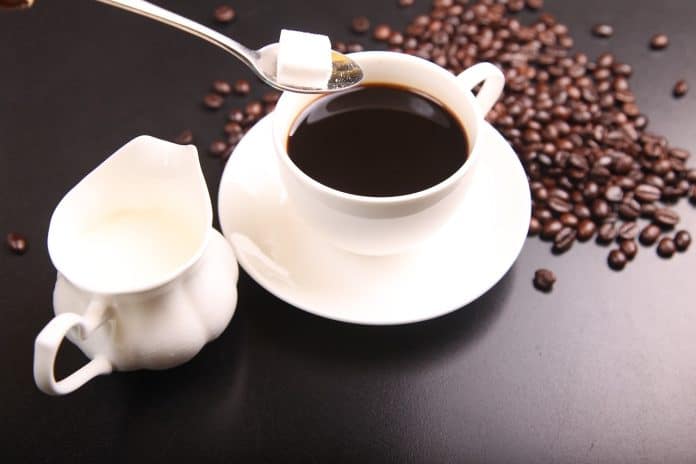By Bipinpreet S. Nagra, MD
Coffee anyone?
If you rely on a jolt of caffeine to help kickstart your morning or power through that afternoon slump, you’re not alone.
Americans drink an estimated 440 million cups of coffee every day, according to the American Coffee Association, and that’s just coffee.
Add in tea, soda and energy drinks, and statistics show that more than 90% of Americans have at least one caffeinated beverage every day.
February is American Heart Month and it’s a good time to explore how your love affair with caffeine may affect your heart.
What is Caffeine?
Caffeine is a naturally occurring chemical compound classified as a stimulant drug. It is found in various plants, most notably in coffee beans, tea leaves, cacao beans (used to make chocolate), and kola nuts (used in some soft drinks).
A cup of green tea may have 35 milligrams of caffeine, while black tea may have 55 milligrams and a small cup of coffee 75 milligrams. Larger cups of coffee will obviously deliver more caffeine.
Caffeine acts as a central nervous system stimulant, meaning it affects the brain and nervous system by blocking the action of adenosine, a neurotransmitter that promotes relaxation and sleepiness.
By blocking adenosine receptors, small to moderate amounts of caffeine may increase alertness, reduce fatigue, and enhance cognitive function. However, higher doses can lead to adverse effects such as anxiety, restlessness, insomnia, heart burn and reduced concentration.
How Does Caffeine Affect Your Heart?
For decades, researchers have studied the effects of caffeine on cardiovascular health, and in general it appears that caffeine — in small doses for people who are not sensitive to it — seems to have a place in a heart healthy lifestyle.
Though people may associate caffeine with high blood pressure or may be concerned about its effect on heart rate or arrhythmias, there is little evidence that caffeine has a significant impact on any of those in most people.
- Blood pressure. Caffeine is a vasoconstrictor, meaning it temporarily narrows blood vessels. So, when it comes to blood pressure, caffeine may cause it to rise, but for most people the increase is minimal and temporary, and pressure returns to normal within a few hours. People with hypertension, however, may be more sensitive to caffeine and should monitor how it impacts their blood pressure.
- Heart rate and arrhythmia. In addition to being a vasoconstrictor, caffeine stimulates the release of adrenaline, a hormone that can increase heart rate and potentially trigger palpitations or arrhythmias in sensitive individuals. These effects are usually mild and transient. In fact, the American Heart Association in 2020 concluded that lowering or limiting caffeine intake has not been demonstrated to significantly affect the incidence of atrial fibrillation, one of the most common types of arrhythmias. The Association did note that more research is necessary.
- Heart failure. Perhaps most interestingly, studies suggest that coffee may reduce the risk of heart failure. According to research published in Circulation: Heart Failure, an American Heart Association journal, drinking one or more cups of caffeinated coffee a day may reduce the risk of heart failure. It’s unclear whether the same findings apply to other caffeinated beverages.
- Cholesterol. It’s also interesting to note that unfiltered coffee such as espresso, French press and Turkish coffees contain substances called diterpenes that can raise cholesterol levels, which can increase the risk for heart disease. Filtered or drip coffee does not contain diterpenes, and therefore does not raise cholesterol levels.
What About Energy Drinks?
Energy drinks are not regulated by the U.S. Food and Drug Administration and can have potent effects. Some energy drinks can have a mind boggling 300 to 400 milligrams of caffeine per serving.
In addition, many energy drinks have an added stimulant, such as guarana. Guarana is a seed from a South American plant and can have up to four times as much caffeine compared to coffee beans. On top of that, energy drinks also have loads of added sugar.
A handful of deaths have been reported after consumption of energy drinks in vulnerable groups, such as children and people with underlying health issues.
If you are looking for a caffeine fix, coffee or tea are the healthier and safer choices.
Can I Enjoy My Morning Cup of Joe?
Coffee has hundreds of different chemical compounds in it other than caffeine. A large number of phenols in coffee have important biochemical effects that can benefit your heart and overall health.
Some studies suggest that coffee drinkers live longer and may have lower risks of diabetes, stroke, Parkinson’s disease, cardiovascular conditions and cancers. Researchers have also suggested that coffee may have protective effects on liver and that some substances in coffee may have beneficial effects on glucose metabolism, inflammation and endothelial dysfunction.
Further, the phenolic compounds coffee (chlorogenic acid, ferulic acid, and p-coumaric acid) have strong antioxidant capacity.
The American Heart Association, however, warns that popular coffee-based drinks such as lattes and macchiatos are often high in calories, added sugar and fat.
Additionally, the American Academy of Pediatrics recommends that in general children avoid beverages with caffeine.
Keep in mind that caffeine can also interfere with sleep, which is critical to your overall health, so it’s important to avoid it later in the day.
So, yes, go ahead and enjoy your morning cup of joe, but do so in moderation, and talk to your doctor if you have any concerns about how it impacts your heart or overall health.
To find a physician affiliated with Penn Medicine Princeton Health call (888) 742-7496 or visit www.princetonhcs.org.
Bipinpreet S. Nagra, MD, is board certified in cardiovascular disease and is a member of the medical staff at Penn Medicine Princeton Health.

